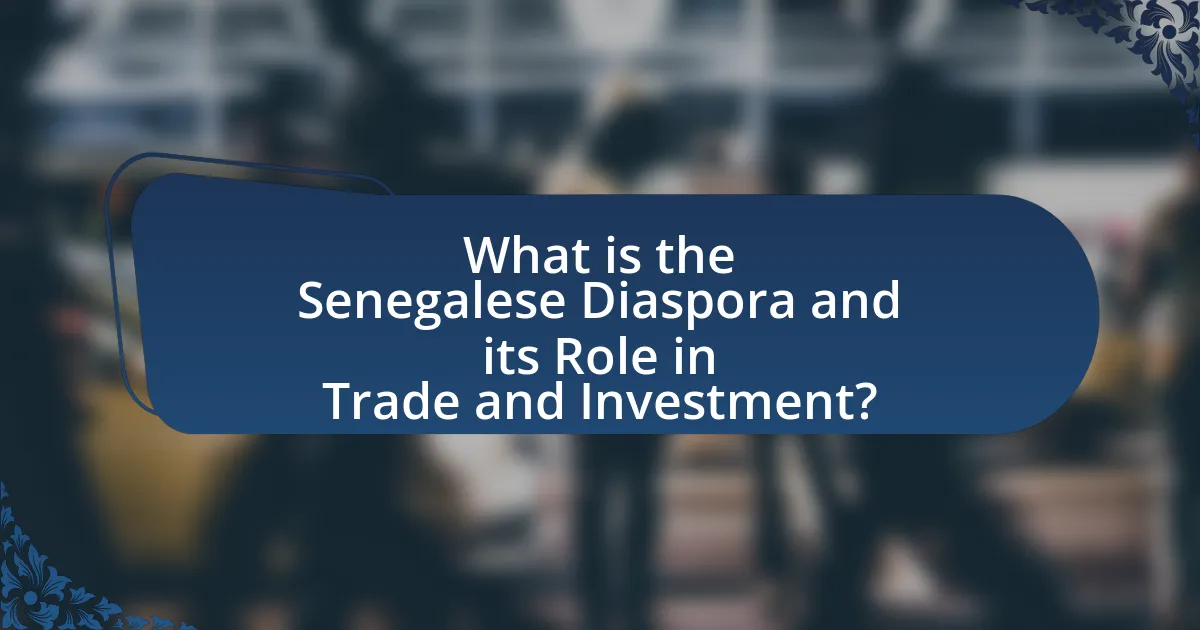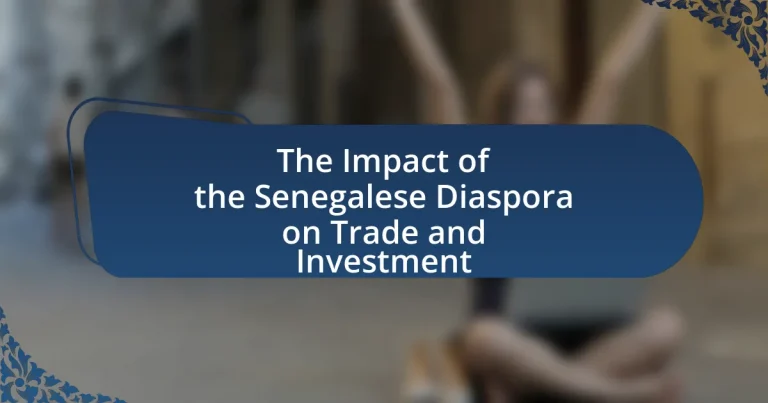The Senegalese Diaspora comprises individuals of Senegalese origin residing outside the country, significantly influencing trade and investment in Senegal. This community contributes approximately $2.4 billion in remittances annually, accounting for about 10% of the nation’s GDP, while also investing in local businesses and real estate. The article explores the historical evolution of the diaspora, its role in facilitating international trade, and the impact of cultural and educational factors on economic contributions. Additionally, it addresses the challenges faced by the diaspora in trade, highlights successful investment stories, and outlines best practices for enhancing their economic impact in Senegal.

What is the Senegalese Diaspora and its Role in Trade and Investment?
The Senegalese Diaspora refers to the community of Senegalese individuals living outside Senegal, which plays a significant role in trade and investment. This diaspora contributes to the Senegalese economy through remittances, which amounted to approximately $2.4 billion in 2020, representing about 12% of the country’s GDP. Additionally, members of the diaspora often invest in local businesses and real estate, fostering economic development and creating job opportunities in Senegal. Their networks facilitate international trade by connecting Senegalese products with global markets, enhancing export potential.
How has the Senegalese Diaspora evolved over time?
The Senegalese Diaspora has evolved significantly over time, transitioning from a primarily labor migration pattern to a more diverse and influential community engaged in various sectors. Initially, during the colonial period and post-independence, many Senegalese emigrated for labor opportunities in France and other countries, primarily driven by economic necessity. As of 2021, approximately 3 million Senegalese live abroad, with a growing number establishing businesses and contributing to the economy of both their host countries and Senegal. This shift is evidenced by the increase in remittances, which reached around $2.4 billion in 2020, accounting for about 10% of Senegal’s GDP. The diaspora now plays a crucial role in trade and investment, fostering connections that facilitate economic development and cultural exchange.
What historical events contributed to the formation of the Senegalese Diaspora?
The formation of the Senegalese Diaspora was significantly influenced by the transatlantic slave trade, colonialism, and economic migration. The transatlantic slave trade, which forcibly removed millions of Africans, including many from Senegal, established early patterns of migration and diaspora communities in the Americas and Europe. Following this, French colonial rule in Senegal from the 17th century to the mid-20th century further facilitated migration as Senegalese individuals sought opportunities in France and other French territories. Additionally, economic factors, such as the search for better employment and living conditions, led to increased migration in the late 20th and early 21st centuries, with many Senegalese moving to Europe and North America for work. These historical events collectively shaped the Senegalese Diaspora, creating networks that continue to influence trade and investment between Senegal and the global economy.
How does the size and distribution of the Senegalese Diaspora impact trade and investment?
The size and distribution of the Senegalese Diaspora significantly enhance trade and investment by creating networks that facilitate economic exchanges and attract foreign direct investment. A large diaspora, estimated at over 3 million people, primarily located in Europe and North America, serves as a bridge between Senegal and host countries, promoting bilateral trade relationships. For instance, remittances from the diaspora, which reached approximately $2.2 billion in 2021, contribute to local consumption and investment in Senegal, stimulating economic growth. Additionally, diaspora members often invest in businesses back home, leveraging their international connections to access markets and resources, thereby fostering entrepreneurship and innovation in Senegal.
What are the key characteristics of the Senegalese Diaspora?
The key characteristics of the Senegalese Diaspora include a strong sense of community, economic contributions through remittances, and cultural preservation. The Senegalese Diaspora is known for its robust networks that facilitate social support and economic collaboration among members, often leading to significant remittance flows back to Senegal, which accounted for approximately 10% of the country’s GDP in 2020. Additionally, the diaspora actively engages in cultural exchanges, maintaining ties to Senegalese traditions, language, and customs, which helps to reinforce their identity while living abroad.
How does the educational background of the diaspora influence trade and investment?
The educational background of the diaspora significantly influences trade and investment by enhancing their capacity to engage in international markets and attract foreign investment. Individuals with higher education levels often possess specialized skills and knowledge that facilitate business operations, improve negotiation capabilities, and foster innovation. For instance, a study by the World Bank indicates that educated diaspora members are more likely to establish businesses that connect their home countries with global markets, thereby increasing trade volumes. Additionally, their educational experiences abroad can lead to the development of networks that provide access to capital and investment opportunities, further stimulating economic growth in their countries of origin.
What cultural factors affect the diaspora’s engagement in trade and investment?
Cultural factors significantly influence the Senegalese diaspora’s engagement in trade and investment. These factors include shared language, cultural identity, and social networks, which facilitate trust and collaboration among diaspora members. For instance, the use of Wolof and French among Senegalese expatriates fosters communication and strengthens business relationships, enhancing trade opportunities. Additionally, cultural values emphasizing community support and collective success motivate diaspora individuals to invest in their homeland, as evidenced by the growing number of remittances and investments directed towards Senegalese businesses. According to the World Bank, remittances from the Senegalese diaspora reached approximately $2.5 billion in 2020, highlighting the economic impact of these cultural connections.
What is the significance of remittances from the Senegalese Diaspora?
Remittances from the Senegalese Diaspora are significant as they contribute substantially to Senegal’s economy, accounting for approximately 10% of the country’s GDP. These financial transfers provide essential support for families, enhance household consumption, and improve living standards. In 2021, remittances to Senegal reached around $2.4 billion, highlighting their role in poverty alleviation and economic stability. Furthermore, these funds often facilitate investments in education, healthcare, and small businesses, thereby fostering local development and economic growth.
How do remittances contribute to local economies in Senegal?
Remittances significantly contribute to local economies in Senegal by providing essential financial support to households, which in turn stimulates local consumption and investment. In 2021, remittances to Senegal reached approximately $2.4 billion, accounting for about 10% of the country’s GDP. This influx of funds enables families to invest in education, healthcare, and small businesses, thereby enhancing economic stability and growth. Furthermore, remittances help reduce poverty levels, as they allow recipients to improve their living conditions and access better services, ultimately fostering community development and economic resilience.
What role do remittances play in funding investments in Senegal?
Remittances play a crucial role in funding investments in Senegal by providing a significant source of capital for households and local businesses. In 2021, remittances to Senegal reached approximately $2.4 billion, accounting for about 10% of the country’s GDP. This influx of funds enables families to invest in education, healthcare, and small enterprises, thereby stimulating economic growth. Furthermore, remittances often serve as collateral for loans, facilitating access to credit for investment purposes. Studies indicate that remittances contribute to poverty reduction and enhance financial stability, making them a vital component of Senegal’s economic landscape.

How does the Senegalese Diaspora influence international trade?
The Senegalese Diaspora significantly influences international trade by facilitating remittances, enhancing market access, and promoting cultural exchange. Remittances from the diaspora, which totaled approximately $2.5 billion in 2020, provide essential financial support to families in Senegal, thereby increasing local purchasing power and stimulating demand for imported goods. Additionally, members of the diaspora often establish businesses that connect Senegalese products to international markets, creating trade networks that enhance export opportunities. Furthermore, the diaspora plays a crucial role in cultural exchange, which can lead to increased interest in Senegalese goods and services abroad, further boosting trade.
What networks exist within the Senegalese Diaspora that facilitate trade?
The Senegalese Diaspora has established several networks that facilitate trade, including the Senegalese Business Network, the Association of Senegalese in the Diaspora, and various regional chambers of commerce. These networks connect Senegalese entrepreneurs and businesses abroad with those in Senegal, promoting investment and trade opportunities. For instance, the Senegalese Business Network has been instrumental in organizing trade fairs and business forums that encourage collaboration between local and diaspora businesses, thereby enhancing economic ties. Additionally, the Association of Senegalese in the Diaspora often provides resources and support for trade initiatives, helping to bridge gaps in market access and information.
How do these networks connect Senegalese businesses with international markets?
Networks connect Senegalese businesses with international markets primarily through diaspora engagement, facilitating trade relationships and investment opportunities. These networks leverage the global presence of Senegalese expatriates who often act as intermediaries, providing local businesses with access to foreign markets, resources, and expertise. For instance, the Senegalese diaspora in France and the United States has established platforms that promote Senegalese products, enabling businesses to reach consumers abroad. Additionally, organizations like the Senegalese Chamber of Commerce in the U.S. actively support trade missions and networking events, which enhance visibility and foster partnerships between Senegalese entrepreneurs and international buyers. This connection is further evidenced by the increase in remittances and investments from the diaspora, which amounted to over $2 billion in 2020, significantly contributing to the national economy and facilitating international market access for local businesses.
What role do diaspora entrepreneurs play in promoting trade?
Diaspora entrepreneurs play a crucial role in promoting trade by leveraging their networks and knowledge of both their host and home countries. They facilitate cross-border trade by establishing businesses that connect local markets with international suppliers and consumers. For instance, Senegalese diaspora entrepreneurs often import goods from Senegal to their host countries, thereby increasing the visibility and demand for Senegalese products abroad. Additionally, they contribute to trade by sharing market insights, cultural understanding, and business practices that enhance trade relationships. According to a study by the World Bank, diaspora networks can significantly reduce transaction costs and risks associated with international trade, thus fostering economic growth in their home countries.
What are the challenges faced by the Senegalese Diaspora in trade?
The Senegalese Diaspora faces several challenges in trade, including limited access to capital, regulatory barriers, and cultural differences. Limited access to capital restricts their ability to invest in businesses or trade ventures, as many members lack sufficient financial resources or credit history in their host countries. Regulatory barriers, such as complex import/export regulations and tariffs, hinder their ability to navigate international markets effectively. Additionally, cultural differences can create misunderstandings in business practices and negotiations, further complicating trade relationships. These challenges collectively impede the Senegalese Diaspora’s potential to contribute significantly to trade and investment.
How do regulatory barriers affect diaspora-led trade initiatives?
Regulatory barriers significantly hinder diaspora-led trade initiatives by imposing restrictions that limit market access and increase operational costs. For instance, complex customs regulations and high tariffs can deter Senegalese entrepreneurs abroad from engaging in trade with their home country, reducing the volume of goods exchanged. According to the World Bank, countries with cumbersome regulatory environments experience a 20% decrease in trade volume, which directly impacts the ability of diaspora communities to contribute to their homeland’s economy. Additionally, inconsistent regulatory frameworks can create uncertainty, discouraging investment and collaboration between diaspora businesses and local enterprises in Senegal.
What are the common misconceptions about the Senegalese Diaspora’s role in trade?
Common misconceptions about the Senegalese Diaspora’s role in trade include the belief that they primarily engage in informal trading and lack significant influence on formal markets. In reality, the Senegalese Diaspora actively participates in both formal and informal trade, contributing to the economy through remittances and investments. According to the World Bank, remittances from the Senegalese Diaspora accounted for approximately 10% of Senegal’s GDP in 2020, highlighting their substantial economic impact. Furthermore, many members of the Diaspora are involved in establishing businesses and trade networks that facilitate exports and imports, thereby enhancing Senegal’s global trade connections.

What impact does the Senegalese Diaspora have on investment in Senegal?
The Senegalese Diaspora significantly impacts investment in Senegal by facilitating financial remittances and fostering entrepreneurial ventures. In 2020, remittances from the Senegalese Diaspora amounted to approximately $2.4 billion, accounting for about 10% of Senegal’s GDP, which directly supports local economies and investment opportunities. Additionally, members of the Diaspora often invest in businesses and real estate in Senegal, contributing to job creation and economic development. Studies indicate that these investments are crucial for sectors such as agriculture, technology, and tourism, enhancing overall economic growth and stability in the country.
How does the diaspora contribute to foreign direct investment (FDI) in Senegal?
The Senegalese diaspora significantly contributes to foreign direct investment (FDI) in Senegal by leveraging their financial resources, networks, and expertise to facilitate investment opportunities. This diaspora, estimated to comprise over 3 million individuals, often invests in sectors such as real estate, agriculture, and technology, thereby stimulating economic growth. For instance, remittances from the diaspora reached approximately $2.5 billion in 2020, which not only support local consumption but also serve as a catalyst for FDI by enhancing the financial capacity of families to invest in local businesses. Additionally, diaspora members frequently act as intermediaries, connecting foreign investors with local entrepreneurs, which further promotes FDI inflows into Senegal.
What sectors in Senegal benefit most from diaspora investments?
The sectors in Senegal that benefit most from diaspora investments are agriculture, real estate, and telecommunications. Agriculture receives significant funding from the diaspora, which supports local farming initiatives and enhances food security. Real estate investments are driven by the diaspora’s interest in property development and housing, contributing to urban growth. Telecommunications sees substantial investment as the diaspora funds technology upgrades and infrastructure improvements, facilitating better connectivity. These sectors collectively demonstrate the positive impact of diaspora investments on Senegal’s economic development.
How do diaspora investors navigate the local investment landscape?
Diaspora investors navigate the local investment landscape by leveraging their unique insights and connections to identify opportunities and mitigate risks. They often utilize their understanding of local culture, market dynamics, and regulatory environments to make informed investment decisions. For instance, studies have shown that diaspora networks facilitate access to information and resources, enabling investors to engage with local businesses more effectively. Additionally, diaspora investors frequently collaborate with local partners, which enhances their ability to navigate bureaucratic challenges and cultural nuances, ultimately leading to more successful investment outcomes.
What are the success stories of diaspora-led investments in Senegal?
Diaspora-led investments in Senegal have led to significant success stories, particularly in sectors such as agriculture, real estate, and technology. For instance, the Senegalese diaspora has invested in agricultural projects that enhance food security and create jobs, with initiatives like the “Diaspora Agriculture Fund” supporting local farmers through financial and technical assistance. Additionally, real estate developments funded by diaspora members have transformed urban areas, contributing to economic growth and infrastructure improvement. In the technology sector, the establishment of startups like “JokkoLabs,” which was partly funded by diaspora investments, has fostered innovation and entrepreneurship, creating a vibrant tech ecosystem in Dakar. These examples illustrate the positive impact of diaspora-led investments on Senegal’s economy and development.
What lessons can be learned from successful diaspora investments?
Successful diaspora investments demonstrate the importance of leveraging cultural connections and networks to enhance economic growth. These investments often benefit from the diaspora’s understanding of local markets, which can lead to more informed decision-making and risk management. For instance, the Senegalese diaspora has invested in various sectors, including agriculture and technology, contributing to a reported 7% increase in GDP from remittances and investments in 2020. Additionally, successful diaspora investments highlight the significance of establishing trust and collaboration between local entrepreneurs and diaspora investors, fostering sustainable business practices and community development.
How do these success stories inspire future investments from the diaspora?
Success stories from the Senegalese diaspora inspire future investments by showcasing tangible outcomes and successful business models that can be replicated. These narratives highlight the potential for economic growth and innovation within Senegal, encouraging diaspora members to invest in similar ventures. For instance, successful entrepreneurs who have returned or invested in Senegal often report increased profitability and community impact, which serves as a compelling proof point for others considering investment. Additionally, these stories foster a sense of trust and connection, as they demonstrate the viability of investing in local markets, ultimately motivating more diaspora individuals to contribute financially to their homeland’s development.
What best practices can diaspora members follow to enhance their impact on trade and investment?
Diaspora members can enhance their impact on trade and investment by actively engaging in knowledge transfer and networking within their host countries and home country. By leveraging their unique position, they can facilitate connections between businesses in Senegal and potential investors abroad, thus promoting trade opportunities.
Research indicates that diaspora networks significantly contribute to foreign direct investment (FDI) in their home countries; for instance, a study by the World Bank found that diaspora investments can lead to a 20% increase in FDI inflows. Additionally, diaspora members can provide valuable insights into market trends and consumer preferences, which can help local businesses adapt and thrive in competitive environments.
Furthermore, participating in trade missions and investment forums can amplify their influence, as these platforms allow diaspora members to showcase Senegalese products and services while attracting international partners. By following these best practices, diaspora members can effectively bridge gaps between markets and enhance trade and investment outcomes for Senegal.





